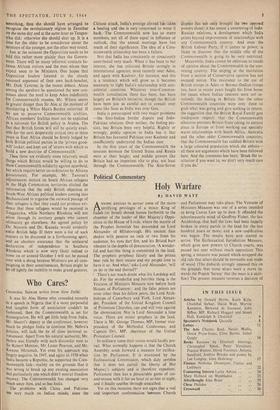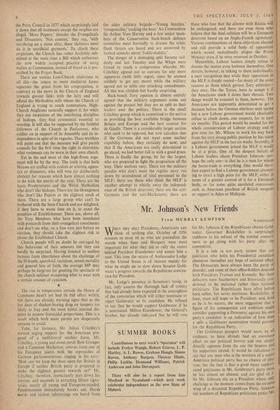Political Commentary
Holy Warfare
By DAVID ,WATT
A NYONE anxious to savour some of the more
terrifying privileges of a minor King of Judah (or Israel) should hasten forthwith to the chamber of the leader of Her Majesty's Oppo- sition in the House of Lords, where the mantle of the Prophet Jeremiah has descended on Lord Alexander of Hillsborough. His ancient face shakes with passion an inch or two from his audience, his eyes dart fire, and his Bristol burr vibrates in the depths of denunciation. 'A wonder- ful and horrible thing is committed in the land. The prophets prophesy falsely and the priests bear rule by their means' and my people lave to have it so. And what,' asks Lord Alexander, 'will ye do in the end thereof?' terrifying privileges of a minor King of Judah (or Israel) should hasten forthwith to the chamber of the leader of Her Majesty's Oppo- sition in the House of Lords, where the mantle of the Prophet Jeremiah has descended on Lord Alexander of Hillsborough. His ancient face shakes with passion an inch or two from his audience, his eyes dart fire, and his Bristol burr vibrates in the depths of denunciation. 'A wonder- ful and horrible thing is committed in the land. The prophets prophesy falsely and the priests bear rule by their means' and my people lave to have it so. And what,' asks Lord Alexander, 'will ye do in the end thereof?'
• There's not much doubt what his Lordship will do. For the wonderful and horrible thing is the Vestures of Ministers Measure now before both Houses of Parliament.: and the false priests are none other than. his fellow peers, the Lord Arch- bishops of Cantetbury and York. Lord Alexan- der, President of the United Kingdom Council of Protestant Churches, can and will vote against the abomination. Nor is Lord Alexander a lone voice. There are minor prophets in the land. There is Mr. George Thomas, MP, former vice- president of the Methodist Conference, and
• Captain Orr, MP, chairman of the United Protestant Council.
In ordinary times their voices would hardly pre- vail. What normally happens is that the Church Assembly sends forward a measure for ratifica- tion by Parliament. It is examined by the Ecclesiastical Commission, which duly certifies that it does not curtail the liberty of Her Majesty's Subjects and is therefore expedient. Parliament then has a pleasurable game of cat- and-mouse with it for an hour or so late at night, and it finally souffles through unscathed.
Yet on this occasion there are signs that a real and important confrontation.' between Church
and Parliament may take place. The Vestures of Ministers Measure was one of a series intended . to bring Canon Law up to date. It offended the schoolmasterly mind of Geoffrey Fisher, the last Archbishop, that half the laws had been happily broken in every parish in the land for the last hundred years or more; and a new codification was begun. The results have now started to arrive. The Ecclesiastical Jurisdiction Measure, which gave new powers to Church courts, was passed last year without much opposition. This spring, a measure was passed which scrapped the old rule that..altars should be moveable and made of wood. (The diehards strongly opposed this on the grounds that stone altars were a move to- wards the Popish 'heresy' that the mass is a sacri- fice.) The present measure reverses a decision of
The Privy Council in 1877 which surprisingly laid it down that all vestments except the surplice are illegal. 'More Popery,' thunder the Evangelicals and Dissenters. 'Not content,' they say, 'with sacrificing on a stone altar, these idolators must do it in sacrificial garments.' To clinch these suspicions, the Cburch has rather foolishly sub- mitted at the same time a Bill which authorises the now widely accepted practice of using wafers at Communion, instead of bread as is pre- scribed by the Prayer Book.
There are serious Low-Church objections to all this—the return to more medimval forms separates the priest from his congregation, is contrary to the move in the Church of England towards greater links with the laity and will offend the Methodists with whom the Church of England is trying to reach communion. High- Church Anglicans naturally support it, for while they are suspicious of the interfering discipline of bishops, they find ceremonial essential to worship. It will also be supported by the faithful followers of the Church in Parliament, who soldier on in support of its Assembly and its in- dependence in spite of its vagaries. These worthies will point out that the measure will give parish councils for the first time the right to determine what vestments can be worn in their own church.
Yet in the end most of this high-flown argu- ment will be by the way. The truth is that both Houses are stuffed with zealots or atheists, agnos- tics or dissenters, who will vote (or deliberately abstain) for reasons which have almost nothing to do with the merits of the case. There are the Scots Presbyterians and the Welsh Methodists who don't like bishops. There are the Orangemen who don't like Papists or the slightest smell of them. There are a large group who can't be bothered with the State Church and are delighted, if they have to waste time on it, to exact the penalties of Establishment. There are, above all, the Tory Members who have been inundated with postcards from their evangelical constituents and don't see why, on a free vote just before an election, they should take the slightest risk to please the Established Church.
Church people will no doubt be outraged by this behaviour of their senators but they can hardly be surprised. Having listened to endless lectures from churchmen about the challenge of the H-bomb, apartheid, racialism, sexual morality and general loss of faith, the average MP may perhaps be forgiven for greeting the spectacle of the church militant wondering what to wear with a certain amount of cynicism.
The rise in temperature outside the House of Commons hasn't yet had its full effect within, but there are already warning signs that as the hot days of shadow-boxing drag on tempers are likely to fray and the most trivial internal dis- putes to assume fratricidal proportions. This is a result which both main parties are desperately anxious to avoid.
Take, for instance, Mr. Julian Critchley's motion urging support for the American pro- posal of a multilateral nuclear force. Mr. Critchley, a young and avant-garde Bow Grouper and a Common Marketeer, returns from one of his European jaunts with the reproaches of German parliamentarians ringing in his ears: 'How can we keep the door open for Britain in Europe if neither British party is prepared to make the slightest gesture towards us?' Mr. Critchley, therefore, insouciantly puts down his motion, and succeeds in attracting fifteen signa- tories, nearly all young and European-minded. Pandemonium immediately breaks out. Harsh words and violent splutterings are heard from
the older military brigade—'Young lunatics,' 'irresponsible,' rocking the boat.'Air Commodore Sir Arthur Vere Harvey and a few senior mem- bers of the Conservative back-bench defence committee meet hurriedly to discuss the crisis. Dark threats are heard and are answered by barbed remarks about luddy-duddys.'
The danger of a damaging split became sud- denly real last Tuesday and the Whips were forced to reach a compromise whereby Mr. Critchley agreed not to canvass for any more signatures (with little regret, since he seemed unlikely to get any more) while the military agreed not to table any attacking amendments. All this was childish but hardly surprising.
Back-bench Tory opinion is almost entirely agreed that the military arguments come out against the project but they are as split as their leaders over the politics. There is the small Critchley group which is committed to the notion as providing the best available bridge between Britain and Europe and the best counter for de Gaulle. There is a considerably larger section who used to be opposed, but now calculate that if the Germans did not want some nuclear capability before, they certainly do now; and that if the Americans are really determined to go ahead, we had better fall in with a good grace. There is finally the group, by far the largest, who are prepared to fight the proposition all the way. Their motives vary. There are the military pundits who don't want the regular navy run down by secondment of vital personnel to the MLF; there are those who think the MLF is another attempt to whittle away the independ- ence of the British deterrent; there are the anti- Germans and the anti-Marketeers; there are those who fear that the détente with Russia will be endangered; and there are even those who believe-that the final solution will be a European deterrent based on an Anglo-French agreement. Various combinations of these objections abound and still provide a solid body of opposition which would undoubtedly plague the Prime Minister even if he were returned in October.
Meanwhile, Labour leaders simply refuse to discuss the matter even between themselves. One detects, however, in talking to them individually, a tacit recognition that while their opposition to the MLF is deeply rooted—for many of the same reasons as those which govern Tory attitudes— they may, like the Tories, have to accept it if the Americans stuck it down their throats. Two things would be essential to them, however. The Americans are apparently determined to get a decision before the German elections next spring but a new Labour government would absolutely refuse to climb down, one suspects, for at least six months. This period would be needed for the whole consideration of Labour strategy and to give time for Mr. Wilson to work his way back from the very strong public position he has taken against the MLF in the last six weeks. Secondly, if a Labour government joined the MLF it would be at a price. One of the deepest beliefs of Labour leaders about President Johnson—per- haps the only one—is that he is a man for whom the horse-trade is everything. One would there- fore expect to find a Labour government attempt- ing to exact a high price for the MLF, either in terms of a greater control of it for a European body, or for some quite unrelated concession, such as American purchase of British weapon..; or support in Aden or Malaysia.































 Previous page
Previous page